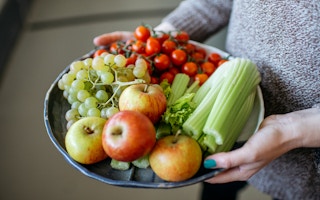A change of diet can work wonders. European scientists have established one priority for the shopper concerned about climate change: don’t worry about shopping for local produce, worry about the meat and dairy products in the shopping basket instead.
Agricultural emissions are a huge factor in the global greenhouse gas budget. But when scientists from the International Institute for Applied Systems Analysis(IIASA) in Austria sat down to calculate the carbon cost in terms of land use change, transportation and dietary choices, they found one overwhelming component.
Bacon, beef, butter, chicken, cheese and milk do more to step up global warming than any conversion of forest to farmland, the canning of beans, or the transport of tea from China, coffee from Brazil or wheat from Canada.
The researchers report in the journal Global Food Security that they calculated the contribution of an average European Union citizen’s food purchases in terms of carbon dioxide equivalent: each person in what will soon be 27 member states notches up 1,070 kilograms in gas emissions each year.
This is about what he or she would produce by driving a passenger vehicle for 6,000 kms. It is also about one-third more than previous production-based emission estimates.
“
People tend to think that consuming locally will be the solution to climate change, but it turns out that the type of product we eat is much more important for overall impact.
Hugo Valin, research scholar, International Institute for Applied Systems Analysis (IIASA)
Some European states, among them Malta and Luxembourg, import up to 70 per cent of their food. Others, like Romania and Poland, import less than 20 per cent. But even after the scientists factored in the carbon costs of land use change, processing and packaging and transport from another country, they found one clear result.
Meat and dairy production account for more than 75 per cent of the climate impact from EU diets. Grazing animals consume crops grown as animal feed; they occupy more of the farmland converted from forest, and they discharge greater quantities of that potent greenhouse gas methane, along with carbon dioxide.
“People tend to think that consuming locally will be the solution to climate change, but it turns out that the type of product we eat is much more important for overall impact,” says one of the report authors, Hugo Valin, a research scholar in ecosystems services and management at IIASA.
Diversifying diet
“Europeans are culturally attached to meat and dairy product consumption. Reducing our climate footprint does not necessarily require stopping eating these food products, but rather diversifying our diets to reduce the share of these.”
The research applies only to the European Union, and because so much of the European diet is imported, direct food production in the EU amounts to less than 5 per cent of global emissions. A new study published in Nature journal delivers a wider picture of the problem facing the whole planet by 2050, when farmers may have to feed as many as 10 billion people.
In one sample year, 2010, the food production system worldwide put more than 5 billion tonnes of carbon dioxide equivalent into the atmosphere, from 12.6 square kilometres of cropland, and consumed 1,810 cubic kilometres of water. This food system also devoured 104 million tonnes of nitrogen and 18 million tonnes of phosphorus as fertilisers.
Cutting waste
By 2050, global income could have tripled, and demand will have increased dramatically. What the scientists politely call the “environmental pressures” of food could increase by from 50 per cent to more than 90 per cent.
But since a third of all food is wasted or lost before it gets to market, there are things societies could do to help. Just halving this waste would reduce pressure on the environment by between 6 per cent and 16 per cent.
And a shift from meat and dairy to fruit and vegetable products – a shift to much healthier eating – could reduce greenhouse gas emissions by up to 56 per cent and other environmental pressures by up to 22 per cent.
But the IAAS researchers warn that there is no single solution. To seriously reduce carbon emissions from the world food system, nations will have to address the problem of waste, the shift to vegetarian or vegan diets, and the need for better farmland management and more efficient technologies, all at the same time.
This story was published with permission from Climate News Network.










